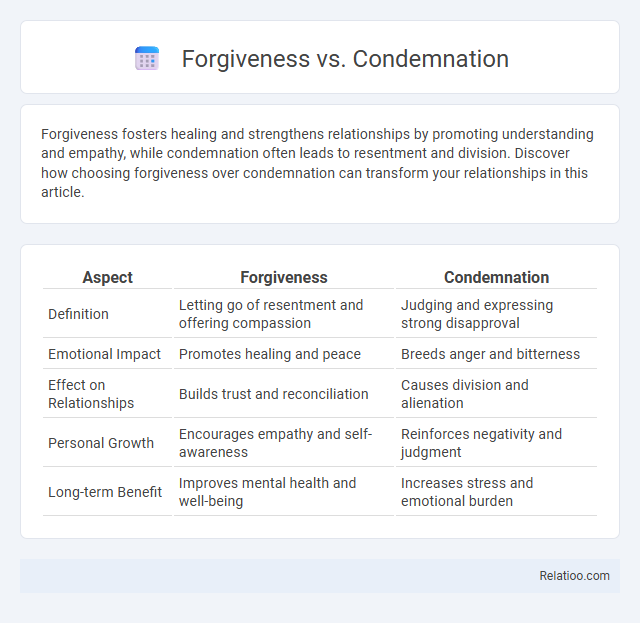Forgiveness fosters healing and strengthens relationships by promoting understanding and empathy, while condemnation often leads to resentment and division. Discover how choosing forgiveness over condemnation can transform your relationships in this article.
Table of Comparison
| Aspect | Forgiveness | Condemnation |
|---|---|---|
| Definition | Letting go of resentment and offering compassion | Judging and expressing strong disapproval |
| Emotional Impact | Promotes healing and peace | Breeds anger and bitterness |
| Effect on Relationships | Builds trust and reconciliation | Causes division and alienation |
| Personal Growth | Encourages empathy and self-awareness | Reinforces negativity and judgment |
| Long-term Benefit | Improves mental health and well-being | Increases stress and emotional burden |
Understanding Forgiveness: Meaning and Importance
Understanding forgiveness involves recognizing it as a conscious decision to release resentment and thoughts of punishment toward someone who has caused hurt, which promotes emotional healing and mental well-being. Forgiveness differs from condemnation, which assigns blame and sustains negative emotions, and from fault, which only identifies responsibility without offering resolution. You can improve your relationships and inner peace by embracing forgiveness as a vital step beyond acknowledging fault or condemning others.
The Nature of Condemnation: Roots and Impact
Condemnation stems from judgment and blame, often rooted in misunderstanding and fear, which deepens emotional wounds and hinders personal growth. Its impact manifests as alienation, guilt, and a barrier to healing, contrasting sharply with forgiveness that fosters empathy and reconciliation. Your ability to recognize these dynamics can transform pain into empowerment by breaking the cycle of fault and condemnation.
Historical Perspectives: Forgiveness vs Condemnation Across Cultures
Historical perspectives reveal that forgiveness and condemnation have been deeply influenced by cultural, religious, and legal traditions worldwide. In many Eastern philosophies, such as Buddhism and Confucianism, forgiveness is viewed as a path to inner peace and social harmony, while Western cultures have often emphasized condemnation through justice systems aimed at retribution or deterrence. Indigenous societies frequently practiced restorative justice, focusing on repairing relationships rather than assigning fault, highlighting a diverse cultural approach to handling wrongdoing beyond mere condemnation or blame.
Psychological Effects: Healing Through Forgiveness
Forgiveness fosters psychological healing by reducing stress, anxiety, and depressive symptoms, promoting emotional resilience and mental well-being. In contrast, condemnation often intensifies negative emotions, sustaining feelings of resentment and hindering recovery from trauma. Acknowledging fault with self-compassion enables personal growth, while forgiveness serves as a transformative process that breaks cycles of blame and fosters inner peace.
Emotional Consequences of Condemnation
Condemnation often leads to intense emotional distress, including feelings of shame, guilt, and lowered self-esteem, which can severely impact Your mental well-being and relationships. Unlike forgiveness, which promotes healing and emotional release, condemnation traps individuals in a cycle of self-criticism and resentment, hindering personal growth. Recognizing the emotional consequences of condemnation is essential for fostering compassion and breaking free from negative emotional patterns.
The Role of Empathy in Forgiving Others
Empathy plays a crucial role in forgiving others by allowing you to understand their emotions and motivations, which reduces feelings of anger and resentment. When empathy is applied, it shifts focus from fault to compassion, making forgiveness a transformative process rather than condemnation. This emotional connection fosters healing and restores relationships by acknowledging human imperfection instead of assigning blame.
Social Dynamics: Community and Collective Reactions
Forgiveness fosters healing and strengthens social bonds by promoting empathy and understanding within a community, while condemnation often triggers division and hostility, escalating conflicts and fostering exclusion. Fault can serve as a platform for accountability or judgment, influencing collective reactions depending on whether the community emphasizes restoration or punishment. Your approach to these dynamics profoundly shapes group cohesion and the social atmosphere, impacting trust and cooperation among members.
Forgiveness in Conflict Resolution
Forgiveness in conflict resolution fosters emotional healing by releasing resentment and promoting understanding between parties involved. Your willingness to forgive can break cycles of blame and fault, replacing condemnation with empathy and constructive dialogue. This approach enhances relationship repair and creates a foundation for lasting peace and collaboration.
Obstacles to Letting Go: Why We Struggle to Forgive
Obstacles to letting go often stem from deep emotional wounds tied to fault, where your mind fixates on blame rather than healing. Condemnation intensifies this struggle by fostering resentment, making forgiveness seem like surrender or weakness. Overcoming these barriers requires recognizing how clinging to fault and judgment impedes your emotional freedom and inner peace.
Choosing Forgiveness Over Condemnation: Steps Toward Personal Growth
Choosing forgiveness over condemnation involves recognizing Your own imperfections while releasing resentment that hinders emotional healing. This process encourages self-compassion and understanding, enabling personal growth by transforming negative judgment into constructive reflection. Embracing forgiveness fosters resilience and promotes healthier relationships, ultimately breaking the cycle of fault-finding and blame.

Infographic: Forgiveness vs Condemnation
 relatioo.com
relatioo.com